
Extremely Dangerous Precedent: What Risks Does the Recognition of Crimea's Annexation Pose?
In exchange for a peace agreement between Moscow and Kyiv, the U.S. government might consider recognizing Russian control over Crimea. How is Ukraine reacting? And what do experts say?
The United States has reportedly sent a confidential document to its European allies containing proposals for a ceasefire in Russia's war against Ukraine.
One of the key points, according to reports, is the recognition of Russian control over the Ukrainian peninsula of Crimea, which Moscow annexed in 2014. This information was first reported by Bloomberg, American television network CNN, the influential daily Washington Post, and the economic newspaper Wall Street Journal.
According to these reports, the Americans expected a response from Ukraine by April 23. However, before that deadline, a meeting of senior diplomats in London was unexpectedly downgraded to an advisory level after representatives from Germany, the United Kingdom, France, and Ukraine canceled their participation.
U.S. Secretary of State Mark Rubio also did not attend the meeting. Until then, U.S. President Donald Trump had avoided either confirming or denying reports about the possible recognition of Crimea as Russian territory.
How Is Ukraine Reacting?
For over eleven years since the illegal annexation, the Crimea issue has often been a media topic. This time, however, official Kyiv was slow to comment on the reports. One of the first to respond was the representative of the Crimean Tatars, Refat Chubarov.
He told Radio Free Europe/Radio Liberty that the Trump administration was attempting to test the Ukrainian leadership with messages about territorial concessions, allegedly necessary for ending the war and achieving lasting peace.
A bit later, the office of the Ukrainian president also responded. Kyiv had not discussed with the U.S. the recognition of Crimea as part of Russia and disagrees with it, presidential adviser Serhiy Leshchenko said on Ukrainian television.
- Czech President Pavel: Trump Pushes for Peace at Any Cost, Regardless of the Consequences for Europe
- Pope’s Will Published: He Left Instructions for His Burial Place
President Volodymyr Zelensky clearly wanted to put an end to the discussion. Responding to journalists' questions on the evening of April 22 in Kyiv, he emphasized that Ukraine would not recognize the Russian occupation of the Autonomous Republic of Crimea, as it would violate the Ukrainian Constitution. "Crimea is not up for discussion," he stressed, reiterating that the peninsula is Ukrainian territory. Trump called the Ukrainian president’s statement "very damaging for peace negotiations with Russia." "If he wanted Crimea, why didn’t they fight for it eleven years ago when it was handed over to Russia without a shot fired?" Trump wrote on his "Truth Social" network on April 23.
Risks of Recognizing Crimea's Annexation
The American Robert Lansing Institute for Global Threats and Democracy (RLI) outlines several risks that recognizing the annexation of Crimea would pose to the international order. According to their analysis, it would represent "a fundamental change in U.S. foreign policy and a break with decades-long legal principles defending territorial integrity." Institute experts highlight:
First, recognizing the annexation of Crimea would be a strategic blow to international norms. It would undermine the principle of territorial integrity established by international law and weaken the legal order set up after World War II. It would also encourage other authoritarian states, like China or Turkey, to engage in territorial revisionism.
Second, it would lead to alienation among allies within the Western bloc. Ukraine would see such a move as a betrayal, and NATO and EU members from Eastern Europe would particularly view it as a capitulation to Russian aggression.
Third, such a step would impact U.S. domestic politics. It would provoke reactions from both parties and raise questions about Donald Trump's true motives, especially amid speculation about his long-standing ties to Moscow.
RLI also warns that recognizing the annexation of Crimea would seriously damage the credibility of U.S. support for democracy and the rule of law around the world—particularly in countries vulnerable to authoritarian pressure.
"An Extremely Dangerous Precedent"
Ukrainian political analyst Volodymyr Fesenko shares this view. In an interview with DW, he said that Crimea is a "red line" and that its loss is "absolutely unacceptable for Ukraine." Legally recognizing Crimea’s annexation would create "an extremely dangerous precedent"—not just for Ukraine but for the entire world, considering China’s claims on Taiwan and elsewhere. Fesenko believes that the downgrading of the London meeting shows that the American proposals reported by the media have been effectively rejected and will no longer be pursued.
András Rácz from the German Council on Foreign Relations (DGAP) also does not expect a diplomatic breakthrough soon. "It’s not surprising that the Ukrainian side rejected the American proposal," he said, noting that it would require Kyiv to officially recognize the annexation of Crimea and effectively give up territory currently held by Russia.
After the London meeting apparently failed, observers are now speculating about which course Washington will take. U.S. Vice President J.D. Vance stated on April 23 that both Ukraine and Russia must relinquish parts of the territories they currently control. The U.S. presented Russia and Ukraine with "a very clear proposal." Vance warned: "Now is the time to say ‘yes’—or for the U.S. to pull out of this process."





